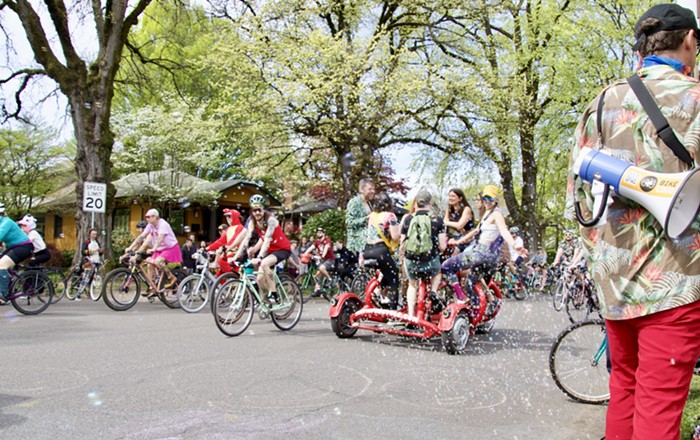Welcome to Portland, #BIKETOWNPDX. pic.twitter.com/vzVznxCQCS
— PDX Transportation (@PBOTinfo) January 7, 2016
In December 2011, it was big news when Metro approved $2 million in funding that would be used to build a bike share system in Portland. Until today, those were about the gladdest tidings the city's bike share ambitions have had.
Not anymore. After years of stonewalling, Nike is coming out in a huge way for Portland's planned bike share program. A $10 million, five-year deal the company and city officials announced this morning means Portland finally has a name for the system that will roll out this summer: Biketown.
This deal is objectively huge if you care about bike share. It more than doubles the $4 million the Portland Bureau of Transportation (PBOT) has been angling for from a title sponsor. That money's been sought for years, but the city's repeatedly failed to find an interested partner. It looked, at one point, like a deal might have been reached with health care provider Kaiser Permanente, but that fell through.
As a result, a system initially promised in 2013 has been delayed again and again.
The cash means Portland can roll out a 1,000-bike system this July—66 percent more than the 600-unit system City Council approved last year, and even larger than the 750-bike system Portland has envisioned in the past.
"This is how public-private partnerships should be done," Transportation Commissioner Steve Novick said in a prepared statement. "In Nike, we have a sponsor that is a brand powerhouse and a global leader in innovation."
This is all going to be very, very orange. "Nike orange," according to the company.
And of course, they brought a bike. #pdxbikes pic.twitter.com/oTqcQ0XtET
— Elliot Njus (@enjus) January 7, 2016
There's also talk of roughly 400 bikes in the system having separate "limited edition wrap designs," that "will reflect the city's creative spirit." Who knows what it means?
Here was the initial mockup, if the city didn't find a sponsor:

As we've reported, the system Portland's now planning differs from many bike share setups you might have seen in Seattle, Chicago, or New York (and many other cities). Rather than bikes that are tethered to "smart" docking stations, Portland's system, supplied by New York-based Social Bicycles, will consist of a fleet of "smart bikes." They'll have computer systems and locks on board, meaning you can park them anywhere around town (though you'll have to pay more if that's outside of prescribed areas). Officials say the system is far cheaper than dock-centric offerings. Portland's 1000-bike program would be the largest of its kind in the country.
And the stepped up ambitions of that system may mean more of Portland gets a crack at bike share than initially expected. The program was always going to center around close-in Portland, then work its way outward as revenues allowed. More bikes may mean some of that expansion can occur sooner, which is crucial if Portland wants to create an equitable and inclusive system—not merely a fun thing for tourists. Here's where the city planned on concentrating a 600-bike program.
All this came together only in the last few months. When PBOT unveiled its plans for a 600-bike system in September, it hinged on the fact that Portland had the money to buy the thing—that same $2 million from 2011 (only $1.8 million was left). There were no guarantees that a sponsor would emerge, and Motivate, the company tapped to run the system, agreed to take on significant financial risks if willing corporations couldn't be found.
Motivate said at the time it was confident it could dig up interest. The company, formerly Portland-based Alta Bicycle Share, had recently been sold to New York-based investors, landed high-profile leadership, and said it was putting extensive resources into marketing Portland's program. That appears to have paid off.
"This is a great day for bike share and a great day for Portland," PBOT director Leah Treat, a huge bike share supporter, said in a news release. “Developing a world-class bike share system was something I promised to Portlanders when I joined PBOT two years ago. With Nike as a sponsor, we’re going to deliver on that promise in a huge way."













